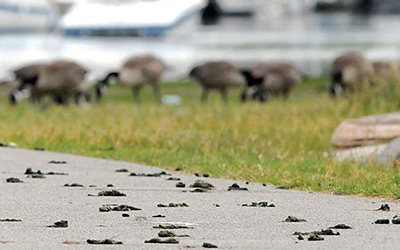Have you ever found yourself dodging away from goose droppings on the sidewalk? While it may be gross and unsightly, there’s more to worry about than just the inconvenience. Goose droppings can pose a hidden danger to both humans and pets, as they can carry dangerous diseases and bacteria such as E Coli, Salmonella, Histoplasmosis, Campylobacter, Coccidia, and Giardia.
The Bacteria Found in Goose Droppings
E Coli
E Coli, while harmless in its normal state, can become a serious threat when exposed to harmful strains. Symptoms of E Coli infection range from vomiting and diarrhea to more severe conditions such as gastroenteritis, urinary tract infections, neonatal meningitis, and even Crohn’s disease. In some cases, it can lead to Hemolytic Uremic Syndrome, which can result in kidney failure and, in extreme cases, death. Treatment typically involves fluid replacement and antibiotics.
Salmonella
Salmonella causes an illness known as Salmonellosis, which presents symptoms such as diarrhea, fever, and abdominal cramps. While most people recover without treatment, severe cases may require hospitalization. If left untreated, Salmonella infection can spread to other parts of the body and possibly result in death.
Campylobacter
Campylobacter is a common cause of diarrhea illness in the United States. While less dangerous than E Coli and Salmonella, it can still lead to abdominal cramps, fever, and bloody diarrhea. Some infections may also result in Irritable Bowel Syndrome (IBS) or arthritis.
Histoplasmosis
Histoplasmosis is caused by fungal spores found in bird and bat feces. Symptoms include fever, cough, fatigue, chills, headaches, chest pain, and body aches. While most cases are acute and resolve within a month, individuals with weakened immune systems may develop persistent infections that can spread to other parts of the body.
Coccidia
Coccidiosis is an intestinal infection commonly found in pets caused by single-celled organisms called coccidia. While adult dogs may not be affected, puppies and debilitated adult dogs can experience severe symptoms such as watery diarrhea, dehydration, abdominal distress, and vomiting. Some coccidia types can also infect humans.
Giardia
Giardia is a microscopic parasite that causes a diarrheal illness known as giardiasis. Common symptoms include diarrhea, gas, abdominal cramps, nausea/vomiting, and dehydration. In severe cases, giardiasis can impede physical and mental growth in children and cause malnutrition.
Protecting Your Loved Ones
Children
Children are particularly vulnerable to the dangers of goose droppings due to their underdeveloped immune systems and tendency to put things in their mouths. Infections like E Coli and Salmonella can have severe consequences on their health and development. It’s crucial to ensure their safety during walks and play sessions in areas prone to goose droppings.
Seniors
Seniors may have a harder time fighting off infections than younger individuals. Given their susceptibility, a population of Canada Geese residing in senior living communities could significantly increase the risk of serious infections. Extra precautions must be taken to safeguard their health.
Pets
Even though most healthy pets have robust immune systems, they can still be at risk of acquiring infections from goose droppings. Dogs, in particular, are known for their curious nature and affinity for exploring the world through their tongues. It’s essential to keep dogs on a leash in areas with high goose populations and provide them with clean drinking water to minimize the risk of infection.
Frequently Asked Questions
Have more questions about goose droppings and their potential risks? Find answers to commonly asked questions below:
- Q: How can I protect my children from goose droppings?
- Q: Are there any preventive measures for seniors living in areas with goose populations?
- Q: Can pets be vaccinated against diseases caused by goose droppings?
Conclusion
While goose droppings may seem harmless at first glance, they can harbor dangerous diseases and bacteria that pose significant risks to both humans and pets. It’s crucial to take precautions when encountering areas with high goose populations to protect your loved ones from potential infections. For more information and resources on keeping your family safe, visit Pawsoha.









